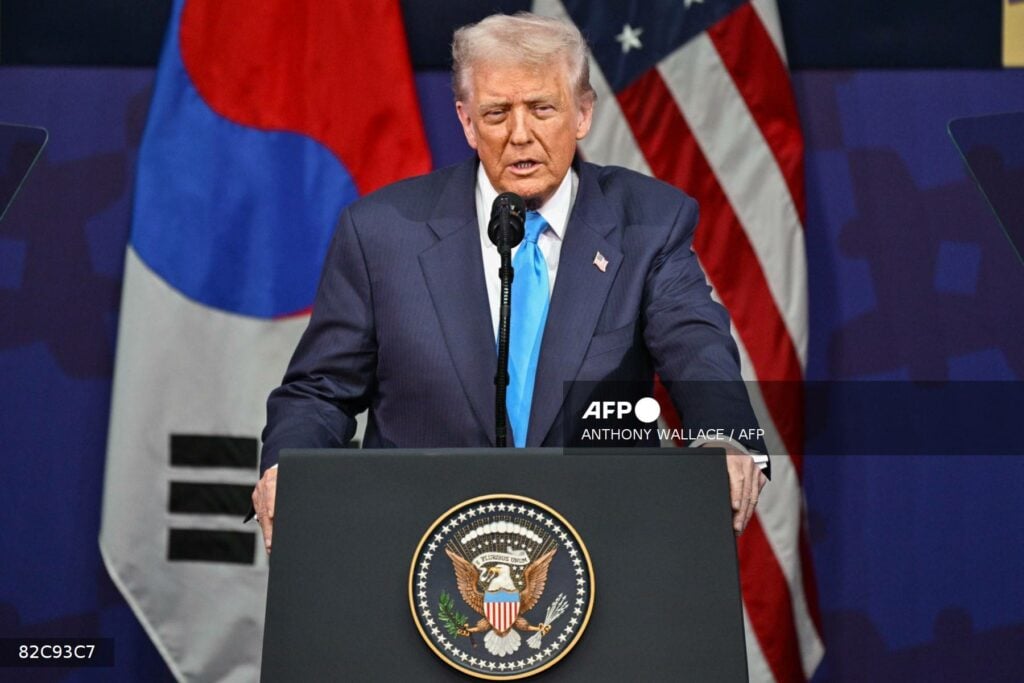Nigeria’s financial markets opened November 2025 on a negative note as both the naira and equities fell sharply following remarks by United States President Donald Trump, who threatened possible military action against Nigeria over alleged religious persecution.
According to data from the Central Bank of Nigeria (CBN), the naira, which had traded at a 2025 peak of ₦1,421.73 per dollar, weakened to ₦1,436.34 per dollar on Monday — marking a 1.03 per cent decline, equivalent to a ₦14.61 loss in one day. In the parallel market, the naira also depreciated to ₦1,455 per dollar, reflecting growing investor anxiety and rising demand for foreign exchange.
The sharp depreciation came after a weekend of rising geopolitical tension triggered by Trump’s comments on his Truth Social platform, where he labelled Nigeria a “country of particular concern” and ordered the U.S. Department of War to prepare for “possible action” if what he described as the “killing of Christians” continued.
Trump’s statements — referring to what he termed a “Christian genocide” in Nigeria — sparked global debate, with analysts warning that his comments could have diplomatic and economic consequences for Africa’s largest economy.
The uncertainty quickly spilled over into the Nigerian Exchange Limited (NGX), where bearish trading resumed on Monday. The All-Share Index fell by 0.25 per cent to close at 153,739.11 points, cutting the year-to-date gain to 49.37 per cent. Market capitalisation also dropped by ₦245.88 billion, settling at ₦97.58 trillion.
The market downturn was mainly driven by sell-offs in Aradel Holdings Plc (-9.21 per cent) and Access Corporation (-3.07 per cent). Investor sentiment remained weak, with 38 stocks declining compared to 19 gainers. Union Dicon led the gainers with a +9.93 per cent rise, while Honeywell Flour Mills Plc topped the losers’ chart with a -10.00 per cent decline.
Market activity also slowed sharply. Total traded volume and value dropped by 87.94 per cent and 44.64 per cent, respectively, to 627.5 million units worth ₦25 billion. United Bank for Africa Plc (UBA) led trading with 136.8 million units (21.8 per cent of total volume) valued at ₦5.5 billion (22.2 per cent of total value).
Sector performance was mixed. The Oil & Gas (-3.94 per cent), Commodities (-1.85 per cent), Insurance (-1.48 per cent), and Banking (-0.22 per cent) sectors all recorded losses, while Consumer Goods rose slightly by 0.49 per cent. The Industrial sector remained flat.
In the bond market, Cowry Assets Management Limited reported weakened investor appetite for Nigeria’s Eurobonds. Average yields rose by five basis points to 7.70 per cent, reflecting global risk aversion and uncertainty over U.S.-Nigeria relations.
Bloomberg data also showed that Nigeria’s dollar-denominated bonds were the worst-performing among emerging markets on Monday. All ten of Nigeria’s Eurobond notes ranked among global underperformers, with bonds maturing in 2047 dropping the most — down 0.6 cents on the dollar to 88.26 cents, before recovering slightly later in the day.
Despite the widespread sell-offs, some analysts believe the impact may be short-lived.
Mr. Tilewa Adebajo, Chief Executive Officer of CFG Advisory, said the market’s reaction was “temporary and not sustainable.”
“This appears to be a mere blip, Closing prices in global markets already reflect signs of recovery. With Nigeria’s recent removal from the FATF Grey List, the country still offers strong long-term fundamentals.”
However, Dr. Musa Yusuf, Chief Executive Officer of the Centre for the Promotion of Private Enterprise (CPPE), warned that Trump’s comments could damage investor confidence and increase economic volatility.
“The U.S. President’s threat of military intervention in Nigeria is unwarranted, counterproductive, and economically destabilising,” Yusuf said in a policy note. “Such remarks send unsettling signals to investors, heighten risk perception, and undermine confidence in Nigeria’s economy.”
Yusuf emphasised that Nigeria must continue to strengthen its internal security, improve governance, and manage diplomatic relations through engagement and cooperation rather than confrontation.
“Unilateral military action would destabilise Nigeria’s economy, threaten regional peace, and worsen humanitarian conditions,” he added. “The constructive path forward lies in diplomacy, partnership, and mutual respect for sovereignty.”
As the Federal Government and the Central Bank of Nigeria prepare responses to the diplomatic situation, analysts say market stability will depend on calm communication, confidence-building measures, and consistent macroeconomic policies.
Nigeria’s markets, already under pressure from inflation and exchange rate volatility, now face additional uncertainty from geopolitical tensions — a situation that could test both investor confidence and policy management in the months ahead.
